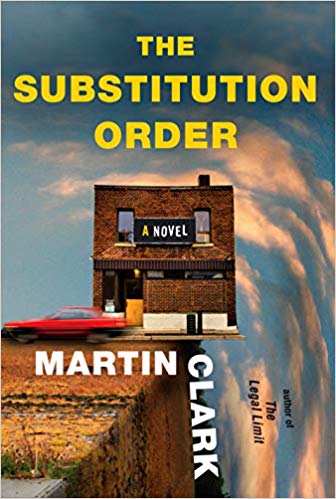“I’ve always warned clients that the criminal justice system doesn’t calibrate well. It’s like a seventies-model Snapper Comet mower – you have three basic blade settings and that’s it. We can handle fistfights, killings, shootings, knife scrapes, larcenies, heterosexual divorces, boundary line disputes and drug sales, the same old same old, but a well-done hustle as rare and layered as this will usually overwhelm a creaky contraption built by bewigged rustics who’d never heard of penicillin and would ooh and aah at a lightbulb.” – Kevin Moore, disgraced lawyer.
 Author Martin Clark, while working for twenty-seven years as a Virginia circuit court judge, somehow managed, at the same time, to write four highly successful novels. His debut from 2000, The Many Aspects of Mobile Home Living, was a New York Times Notable Book for the year and a Book-of-the-Month-Club Selection. Plain Heathen Mischief, in 2004, introduced me to this author, and I was thrilled when its successor, The Legal Limit, in 2008, was on the Washington Post list for Best Book of the Year, and was winner of the Library of Virginia People’s Choice Award for Fiction. The Jezebel Remedy in 2015, led Entertainment Weekly to declare that “Clark is, hands-down, our finest legal thriller writer.” Few full-time writers can come come close to duplicating this kind success, both with readers and with literary critics, and now Martin Clark has officially retired as a judge. Still living in the countryside, on the border between Virginia and North Carolina, where he sets The Substitution Order, there is no telling where he will go with future novels or how many he will write, now that he has more time.
Author Martin Clark, while working for twenty-seven years as a Virginia circuit court judge, somehow managed, at the same time, to write four highly successful novels. His debut from 2000, The Many Aspects of Mobile Home Living, was a New York Times Notable Book for the year and a Book-of-the-Month-Club Selection. Plain Heathen Mischief, in 2004, introduced me to this author, and I was thrilled when its successor, The Legal Limit, in 2008, was on the Washington Post list for Best Book of the Year, and was winner of the Library of Virginia People’s Choice Award for Fiction. The Jezebel Remedy in 2015, led Entertainment Weekly to declare that “Clark is, hands-down, our finest legal thriller writer.” Few full-time writers can come come close to duplicating this kind success, both with readers and with literary critics, and now Martin Clark has officially retired as a judge. Still living in the countryside, on the border between Virginia and North Carolina, where he sets The Substitution Order, there is no telling where he will go with future novels or how many he will write, now that he has more time.

Author Martin Clark, former circuit court judge in Virginia for twenty-seven years, now retired.
Though all his books have an analytical approach to right and wrong, The Substitution Order is the most “legalistic” of his novels so far, a novel which focuses on a brilliant lawyer who, for three months of his life, lost control, made some terrible choices, and now must pay the penalty. Through flashbacks, author Martin Clark brings disgraced lawyer Kevin Moore fully to life. Now living in a small, unincorporated community in rural Patrick County, near the North Carolina border, Kevin has fully recovered from a three-month addiction to cocaine and alcohol and has stayed clean, though he is disbarred. With some court appearances still left in his own case, he works as manager of SUBstitution, a roadside sandwich shop. There he is approached one day by a well-groomed out-of-towner who calls himself “Caleb,” claiming to represent Melanie Culp, one of Kevin’s former clients during his brief “addiction period.” Melanie, Caleb says, is suing Kevin for five million dollars, claiming malpractice because he did not advise her to exercise an option for some undeveloped land. A real estate development company later bought and resold that land for six million dollars, more than five times the original price. Melanie wants the money she would have gained if he had bothered to tell her to exercise her option on that land.

Meadows of Dan, an unincorporated community in Patrick County, VA, where the action takes place.
Kevin denies any knowledge of such a land option, and suspecting a scam, he continues to question Caleb, who openly admits that he actually controls both companies involved in the eventual land sale, and that his ownership is “hidden behind layers of perfectly legal and impenetrable paperwork.” He even admits, with a degree of pride, that “pigs get fat, [only] hogs get slaughtered,” and that he and his group keep their dollar amounts low enough to avoid investigations by insurance companies and monitoring groups. They often use an offshore holding company and work to avoid any overlaps among shell companies and participants. They pay taxes and include legitimate transactions in their finances, as well. A few relatively “small” scams – under five million dollars – funneled through their offshore companies, draw less attention than bigger ones by greedier people. They want the compromised Kevin to work with them. He refuses. They insist.
From this relatively abrupt beginning, author Martin Clark begins the slow, inexorable deterioration of Kevin Moore, as disaster after disaster piles up. Though Kevin is convincing in his insistence that he is telling the truth and is willing to pay for his past mistakes, no one believes him – and with reason. The very real, provable evidence against him on just about every score is overwhelming. Even a check of the SUBstitution’s security cameras show they were somehow “powered off” during his confrontation with Caleb, so there is no record even of that conversation. His drug tests are questionable, his marriage is in trouble, his finances are reduced to practically nil, and he is facing jail time. Then two new charges are brought against him. Believing many of his problems involve the collusion of people hiding in the bureaucracies with which he has had to deal over the years, Kevin takes on the world himself. His inherent kindness keeps his closest friends wanting to believe and to help him, but even many of them begin to tire of his claim of innocence in the face of the overwhelming evidence.

A dog similar to Nelson, the hound Kevin rescued from a trash bin and who keeps him sane.
Author Martin Clark’s characters live and breathe, and even if a reader becomes a bit confused by some of the legal issues in this novel – or stops to question how all these charges against him could possibly be false – s/he will root for Kevin Moore’s success throughout, despite the odds. Several subordinate characters inspire the same feelings of loyalty. Blaine Richardson, a twenty-year-old from a poor family, works at SUBstitution to save money for college, selling weed on the side very quietly. Kevin helps him from the last of his savings, and Blaine, a genius with computers and math, helps Kevin, in turn. Melvin Harrell, the wealthiest man in Patrick County, lets Kevin stay at his house as a caretaker while he is away, and goes so far as to build a pen for Nelson, Kevin’s recent rescue dog. Even Kevin’s best friend from college and law school plays a role here. The vibrant characters, their desire to help Kevin, and author Martin Clark’s own desire to tell a story about people dealing with reality and the law make the complexities of Kevin’s own legal case more understandable and intriguing for non-lawyers. The conclusion, which comes in the last few pages of this complex novel, will stun the reader and resolve many issues. Martin Clark has done it again.
ALSO by Martin Clark: THE LEGAL LIMIT and PLAIN HEATHEN MISCHIEF (Posted on another website in 2004)
Photos. The author’s photo appears on https://hackneylibrary.wordpress.com
Meadows of Dan, where the action takes place, is an unincorporated community on the Virginia/North Carolina border, the area where the author himself lives. http://www.poorfarmersmarket.biz/
The Patrick County Courthouse, where Kevin presented cases before his disbarment: https://commons.wikimedia.org
Kevin’s rescue dog may have been similar to this American bulldog mixed breed puppy – white with brown patch and blue eyes. https://www.dreamstime.com/
Mabry Mill in Meadows of Dan, a serene sight in the midst of tumult. https://www.tripadvisor.com


